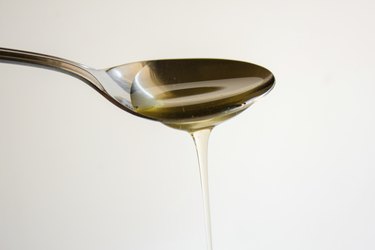
If you're looking for an alternative to sugar, you may be confused about the difference between agave nectar and stevia. Once you understand how these sweeteners are made and how they affect your caloric intake and your blood sugar levels, it should be easier for you to figure out which sweetener is the better alternative for you.
Sweetener Source
Video of the Day
Agave nectar is a syrup made from the agave plant that is 1.5 times sweeter than sugar. What you find in the supermarket, however, is usually highly processed, so it isn't a less-processed alternative to sugar unless you choose one of the raw, organic and unheated versions. Stevia, on the other hand, is an herb whose leaves are 300 times sweeter than sugar. These leaves are only approved as a dietary supplement. Products sold as stevia sweeteners contain an extract of stevia, either stevioside or rebaudioside A, both of which are generally recognized as safe by the U.S. Food and Drug Administration. Some of these sweeteners actually contain mainly sugar alcohols with just a small amount of rebaudioside A or stevioside.
Video of the Day
Calorie Content
The average adult gets about 14.6 percent of their calories from added sugars, according to a position paper published in the "Journal of the Academy of Nutrition and Dietetics" in May 2012. The American Heart Association recommends limiting the amount of sugar and other sweeteners you eat to no more than 100 calories per day for women or 150 calories per day for men. Stevia is a non-nutritive sweetener, meaning it doesn't contain any calories. Agave is actually higher in calories than sugar per teaspoon, with 20 calories vs. 17 in a teaspoon of sugar. Because it is sweeter than sugar, however, you can use less and may save a few calories this way.
Effect on Blood Sugar
Stevia doesn't affect your blood sugar levels and may actually improve your glucose tolerance, according to Oregon State University Extension. Agave nectar is absorbed more slowly by the body than regular sugar, so it doesn't cause as much of a spike in your blood sugar levels, although it does increase your blood sugar somewhat.
Other Considerations
Agave nectar, like other fructose-containing sweeteners, may raise your triglyceride levels, according to an animal study published in "Physiology & Behavior" in December 2009. Further research is necessary to verify this effect occurs in people as well as animals. Higher triglyceride levels may increase your risk for heart disease. There is some concern that the stevia extract stevioside may increase the risk for cancer, but this is based on preliminary studies using test tubes or animals. Although stevia has been used in other countries for over 40 years, there hasn't been a lot of research on the long-term effects of this sweetener, according to registered dietitian Natalie Digate Muth in an article published on the American Council on Exercise website.
- Physiology & Behavior: Effect of Moderate Intake of Sweeteners on Metabolic Health in the Rat
- Fitness Magazine: Get Sweetener Savvy: The Need-to-Know Facts
- Oregon State University Extension: Sweeteners: Nutritive and Non-Nutritive
- Journal of the Academy of Nutrition and Dietetics: Position of the Academy of Nutrition and Dietetics: Use of Nutritive and Nonnutritive Sweeteners
- American Council on Exercise: The Truth About Stevia -- the So-Called "Healthy" Alternative Sweetener